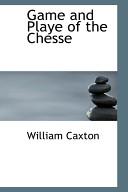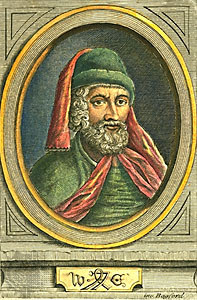Certaynly it is hard to playse every man, by-cause of dyversite and chaunge of langage.
For we Englishmen are born under the domination of the moon, which is never steadfast but ever wavering, waxing one season and waning and decreasing another season. And that common English that is spoken in one shire varies from another, so that in my days it happened that certain merchants were in a ship on the Thames to sail over the sea to Zealand, and for lack of wind, they tarried at Foreland, and went to land to refresh themselves. And one of them named Sheffelde, a mercer, came to a house and asked for food, and especially he asked for egges, and the good woman answered that she could speak no French. And the merchant was angry, for he also could speak no French, but wanted to have egges, and she did not understand him. And then at last another said that he wanted eyren. Then the good woman said that she understood him well. Lo, what should a man in these days now write, egges or eyren? Certainly it is hard to please every man, because of diversity and change of language.
Preface to the Eneydos, 1490.
Works

The Game and Playe of the Chesse
William CaxtonFamous William Caxton Quotes
“He that wil wynne he muste laboure and aventure.”
The History of Reynard the Foxe (1481); cited from Edward Arber An Introductory Sketch to the Martin Marprelate Controversy, 1588-1590 (New York: AMS Press, 1967) p. 27.
The Game and Playe of the Chesse, Bk. III (1474) http://www.bookrags.com/ebooks/10672/73.html
Preface to Sir Thomas Malory Le Morte Darthur (1485); cited from Sir Thomas Malory (ed. Eugène Vinaver) Works (Oxford: Oxford University Press, 1978) p. xiv.
Epilogue to Boethius De Consolacione Philosophie (1478); cited from Daniel Wakelin Humanism, Reading, and English Literature, 1430-1530 (Oxford: Oxford University Press, 2007) p. 15.
